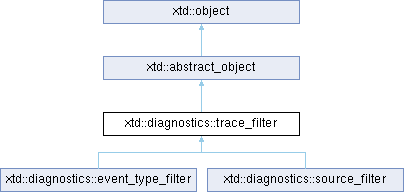Inheritance diagram for xtd::diagnostics::trace_filter:

Definition
Provides the base class for trace filter implementations.
Provides the base class for trace filter implementations.
Definition trace_filter.h:33
#define abstract_
This keyword is used to represents an abstract class.
Definition abstract.h:23
- Inheritance
- xtd::object → xtd::abstract_object → xtd::diagnostics::trace_filter
- Header
- #include <xtd/diagnostics/trace_filter>
- Namespace
- xtd::diagnostics
- Library
- xtd.core
- Remarks
- Trace filters can be used by trace listeners to provide an extra layer of filtering beyond that provided by trace switches. The trace filter for a trace listener can be found in the listener's filter property. Trace switches determine if a trace is to be sent to the trace listeners. Trace filters allow the individual trace listeners to determine whether or not the trace is to be written to the associated output medium. For example, as determined by each trace filter, a trace may be written to the console by a console_trace_listener, but not to the event log by a event_log_trace_listener.
- Filters that inherit from the trace_filter class can be used by trace listeners that inherit from the trace_listener class to perform filtering of events being traced. trace_filter contains a single method, should_trace, which takes event data and returns a flag indicating whether the event should be traced.
Public Methods | |
| virtual bool | should_trace (const xtd::diagnostics::trace_event_cache &cache, const xtd::ustring &source, xtd::diagnostics::trace_event_type event_type, int32 id, const xtd::ustring &message, std::any data1, const std::vector< std::any > &data_array) noexcept=0 |
| When overridden in a derived class, determines whether the trace listener should trace the event. | |
Protected constructors | |
| trace_filter ()=default | |
| Initializes a new instance of the trace_filter class. | |
Protectted methods | |
| bool | should_trace (const xtd::diagnostics::trace_event_cache &cache, const xtd::ustring &source, xtd::diagnostics::trace_event_type event_type, int32 id, const xtd::ustring &message) noexcept |
| determines whether the trace listener should trace the event. | |
| bool | should_trace (const xtd::diagnostics::trace_event_cache &cache, const xtd::ustring &source, xtd::diagnostics::trace_event_type event_type, int32 id, const xtd::ustring &message, std::any data1) noexcept |
| determines whether the trace listener should trace the event. | |
Additional Inherited Members | |
 Public Member Functions inherited from xtd::object Public Member Functions inherited from xtd::object | |
| object ()=default | |
| Create a new instance of the ultimate base class object. | |
| bool | equals (const object &obj) const noexcept |
| Determines whether the specified object is equal to the current object. | |
| virtual size_t | get_hash_code () const noexcept |
| Serves as a hash function for a particular type. | |
| virtual type_object | get_type () const noexcept |
| Gets the type of the current instance. | |
| template<typename object_t > | |
| std::unique_ptr< object_t > | memberwise_clone () const noexcept |
| Creates a shallow copy of the current object. | |
| virtual xtd::ustring | to_string () const noexcept |
| Returns a sxd::ustring that represents the current object. | |
 Static Public Member Functions inherited from xtd::object Static Public Member Functions inherited from xtd::object | |
| static bool | equals (const object &object_a, const object &object_b) noexcept |
| Determines whether the specified object instances are considered equal. | |
| static bool | reference_equals (const object &object_a, const object &object_b) noexcept |
| Determines whether the specified object instances are the same instance. | |
 Protected Member Functions inherited from xtd::abstract_object Protected Member Functions inherited from xtd::abstract_object | |
| abstract_object ()=default | |
| Initializes a new instance of the xtd::abstract_object class. | |
Constructor & Destructor Documentation
◆ trace_filter()
|
protecteddefault |
Initializes a new instance of the trace_filter class.
Member Function Documentation
◆ should_trace() [1/3]
|
protectednoexcept |
determines whether the trace listener should trace the event.
- Parameters
-
cache The trace_event_cache that contains information for the trace event. source The name of the source. event_type One of the trace_event_type values specifying the type of event that has caused the trace id A trace identifier number. message Message to write.
◆ should_trace() [2/3]
|
protectednoexcept |
determines whether the trace listener should trace the event.
- Parameters
-
cache The trace_event_cache that contains information for the trace event. source The name of the source. event_type One of the trace_event_type values specifying the type of event that has caused the trace id A trace identifier number. message Message to write. data1 A trace data object.
◆ should_trace() [3/3]
|
pure virtualnoexcept |
When overridden in a derived class, determines whether the trace listener should trace the event.
- Parameters
-
cache The trace_event_cache that contains information for the trace event. source The name of the source. event_type One of the trace_event_type values specifying the type of event that has caused the trace id A trace identifier number. message Message to write. data1 A trace data object. data_array A trace data object.
Implemented in xtd::diagnostics::event_type_filter, and xtd::diagnostics::source_filter.
The documentation for this class was generated from the following file:
- xtd.core/include/xtd/diagnostics/trace_filter.h
Generated on Wed Apr 10 2024 00:07:15 for xtd by Gammasoft. All rights reserved.
